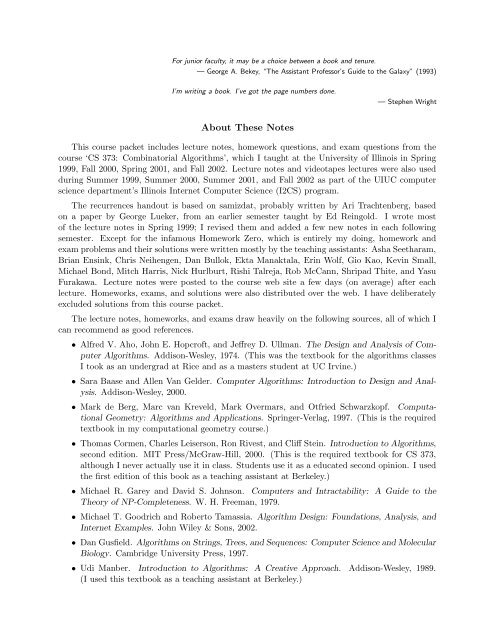CS 373: Combinatorial Algorithms
CS 373: Combinatorial Algorithms
CS 373: Combinatorial Algorithms
You also want an ePaper? Increase the reach of your titles
YUMPU automatically turns print PDFs into web optimized ePapers that Google loves.
For junior faculty, it may be a choice between a book and tenure.<br />
— George A. Bekey, “The Assistant Professor’s Guide to the Galaxy” (1993)<br />
I’m writing a book. I’ve got the page numbers done.<br />
About These Notes<br />
— Stephen Wright<br />
This course packet includes lecture notes, homework questions, and exam questions from the<br />
course ‘<strong>CS</strong> <strong>373</strong>: <strong>Combinatorial</strong> <strong>Algorithms</strong>’, which I taught at the University of Illinois in Spring<br />
1999, Fall 2000, Spring 2001, and Fall 2002. Lecture notes and videotapes lectures were also used<br />
during Summer 1999, Summer 2000, Summer 2001, and Fall 2002 as part of the UIUC computer<br />
science department’s Illinois Internet Computer Science (I2<strong>CS</strong>) program.<br />
The recurrences handout is based on samizdat, probably written by Ari Trachtenberg, based<br />
on a paper by George Lueker, from an earlier semester taught by Ed Reingold. I wrote most<br />
of the lecture notes in Spring 1999; I revised them and added a few new notes in each following<br />
semester. Except for the infamous Homework Zero, which is entirely my doing, homework and<br />
exam problems and their solutions were written mostly by the teaching assistants: Asha Seetharam,<br />
Brian Ensink, Chris Neihengen, Dan Bullok, Ekta Manaktala, Erin Wolf, Gio Kao, Kevin Small,<br />
Michael Bond, Mitch Harris, Nick Hurlburt, Rishi Talreja, Rob McCann, Shripad Thite, and Yasu<br />
Furakawa. Lecture notes were posted to the course web site a few days (on average) after each<br />
lecture. Homeworks, exams, and solutions were also distributed over the web. I have deliberately<br />
excluded solutions from this course packet.<br />
The lecture notes, homeworks, and exams draw heavily on the following sources, all of which I<br />
can recommend as good references.<br />
• Alfred V. Aho, John E. Hopcroft, and Jeffrey D. Ullman. The Design and Analysis of Computer<br />
<strong>Algorithms</strong>. Addison-Wesley, 1974. (This was the textbook for the algorithms classes<br />
I took as an undergrad at Rice and as a masters student at UC Irvine.)<br />
• Sara Baase and Allen Van Gelder. Computer <strong>Algorithms</strong>: Introduction to Design and Analysis.<br />
Addison-Wesley, 2000.<br />
• Mark de Berg, Marc van Kreveld, Mark Overmars, and Otfried Schwarzkopf. Computational<br />
Geometry: <strong>Algorithms</strong> and Applications. Springer-Verlag, 1997. (This is the required<br />
textbook in my computational geometry course.)<br />
• Thomas Cormen, Charles Leiserson, Ron Rivest, and Cliff Stein. Introduction to <strong>Algorithms</strong>,<br />
second edition. MIT Press/McGraw-Hill, 2000. (This is the required textbook for <strong>CS</strong> <strong>373</strong>,<br />
although I never actually use it in class. Students use it as a educated second opinion. I used<br />
the first edition of this book as a teaching assistant at Berkeley.)<br />
• Michael R. Garey and David S. Johnson. Computers and Intractability: A Guide to the<br />
Theory of NP-Completeness. W. H. Freeman, 1979.<br />
• Michael T. Goodrich and Roberto Tamassia. Algorithm Design: Foundations, Analysis, and<br />
Internet Examples. John Wiley & Sons, 2002.<br />
• Dan Gusfield. <strong>Algorithms</strong> on Strings, Trees, and Sequences: Computer Science and Molecular<br />
Biology. Cambridge University Press, 1997.<br />
• Udi Manber. Introduction to <strong>Algorithms</strong>: A Creative Approach. Addison-Wesley, 1989.<br />
(I used this textbook as a teaching assistant at Berkeley.)


